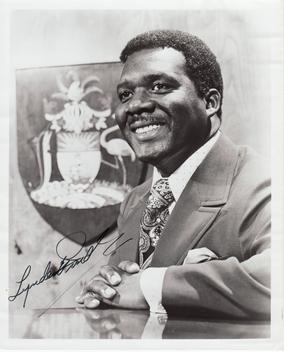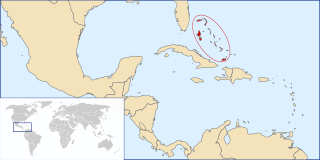Related Research Articles

The Bahamas, officially the Commonwealth of The Bahamas, is an island country within the Lucayan Archipelago of the Atlantic Ocean. It contains 97% of the Lucayan Archipelago's land area and 88% of its population. The archipelagic country consists of more than 3,000 islands, cays, and islets in the Atlantic Ocean, and is located north of Cuba and northwest of the island of Hispaniola and the Turks and Caicos Islands, southeast of the U.S. state of Florida, and east of the Florida Keys. The capital is Nassau on the island of New Providence. The Royal Bahamas Defence Force describes The Bahamas' territory as encompassing 470,000 km2 (180,000 sq mi) of ocean space.

The earliest arrival of people in the islands now known as The Bahamas was in the first millennium AD. The first inhabitants of the islands were the Lucayans, an Arawakan language-speaking Taino people, who arrived between about 500 and 800 AD from other islands of the Caribbean.

Sir Lynden Oscar Pindling, KCMG, PC, NH, JP was a Bahamian politician who is regarded by some as the "Father of the Nation", having led the Bahamas to majority rule and independence.

Perry Gladstone Christie PC, MP is a Bahamian former politician who served as prime minister of the Bahamas from 2002 to 2007 and from 2012 to 2017. He is the second longest-serving Bahamian elected parliamentarian, representing the Centreville constituency from 1977 to 2017. He is also a former athlete. His Progressive Liberal Party is the oldest Bahamian political party, holding solid majorities in the Bahamian Parliament several times in its long history.

Before European colonization, the Turks and Caicos Islands were inhabited by Taíno and Lucayan peoples. The first recorded European sighting of the islands now known as the Turks and Caicos occurred in 1512. In the subsequent centuries, the islands were claimed by several European powers with the British Empire eventually gaining control. For many years the islands were governed indirectly through Bermuda, the Bahamas, and Jamaica. When the Bahamas gained independence in 1973, the islands received their own governor, and have remained a separate autonomous British Overseas Territory since. In August 2009, the United Kingdom suspended the Turks and Caicos Islands' self-government following allegations of ministerial corruption. Home rule was restored in the islands after the November 2012 elections.
Sir Milo Boughton Butler was a Bahamian politician who served as the second governor-general of the Bahamas from 1973 to 1979. He died in office, aged 72.
The Vanguard Nationalist and Socialist Party was a minor political party in the Bahamas in the 1970s and 1980s.

Elections in the Bahamas take place in the framework of a parliamentary democracy. Since independence, voter turnout has been generally high in national elections, with a low of 87.9% in 1987 and a high of 98.5% in 1997. The current Prime Minister is The Hon. Philip Davis. The electorate is less than half of citizenry.

The Bahamas Democratic Movement (BDM) is a liberal-populist political party in the Bahamas representing the interests of young people.

Norman's Cay is a small Bahamian island in the Exumas, a chain of islands south and east of Nassau, that served as the headquarters for Carlos Lehder's drug smuggling operation from 1978 until around 1982.

General elections were held in the Bahamas on 2 May 2002. The opposition Progressive Liberal Party (PLP) won 29 of the 40 seats in the House of Assembly to defeat the governing Free National Movement (FNM). Voter turnout was 90.2%.

The following is an alphabetical list of topics related to the Commonwealth of The Bahamas.

General elections were held in the Bahamas on 26 November 1962, the first under universal suffrage. Whilst the Progressive Liberal Party won the most votes, the United Bahamian Party won the most seats, largely as a result of gerrymandering.

General elections were held in the Bahamas on 10 January 1967. The result was a tie between the Progressive Liberal Party and the United Bahamian Party, both of which won 18 seats. In a reversal of the previous election, this time the PLP received a lower share of the vote than the UBP, but was able to form the country's first black-led government with the support of the sole Labour Party MP Randol Fawkes.

General elections were held in the Bahamas on 10 June 1982. The result was a victory for the Progressive Liberal Party, which won 32 of the 43 seats. Janet Bostwick of the Free National Movement (FNM) became the first female member of the House of Assembly. Surprisingly attorney general and minister of external affairs Paul Adderley and former Leader of the Opposition Norman Solomon lost their seats.
The United Bahamian Party (UBP) was a major political party in the Bahamas in the 1950s and 1960s. Representing the interests of the white oligarchy known as the Bay Street Boys, including Stafford Sands, it was the ruling party between 1958 and 1967. It was led by Roland Theodore Symonette.
The Labour Party was a minor political party in the Bahamas. In the 1962 general elections it won a single seat, taken by Randol Fawkes. Fawkes retained his seat in the 1967 elections, in which the United Bahamian Party and the Progressive Liberal Party won 18 seats each. Although the UBP had won more votes, Fawkes supported the PLP, allowing them to form a government. Fawkes retained his seat again in the 1968 elections, but the party did not contest the 1972 elections.
The Bahamian Democratic Party was a political party in the Bahamas. It was founded as a split from Free National Movement in 1975 and was led by John Henry Bostwick. The party contested the 1977 general elections, in which it received 27% of the vote and won six seats, becoming the largest opposition party in the House of Assembly. As a result, Bostwick was appointed Leader of the Opposition. The party eventually merged with Free National Movement in 1981.
Dame Doris Sands Johnson was a Bahamian teacher, suffragette, and politician. She was the first Bahamian woman to contest an election in the Bahamas, the first female Senate appointee, and the first woman granted a leadership role in the Senate. Once in the legislature, she was the first woman to be made a government minister and then was elected as the first woman President of the Senate. She was the first woman to serve as Acting Governor General of the Bahamas, and was honored as Dame Commander of the Most Excellent Order of the British Empire by Queen Elizabeth II.
References
- ↑ The United Kingdom, the Commonwealth of Nations, a Directory of Governments. Political Research. 1985.
- ↑ Banks, William C. (5 May 1993). Political Handbook of the World 1993. CQ Press. ISBN 978-0-933199-09-5.
- ↑ McCartney, Donald M. (2004). Bahamian Culture and Factors which Impact Upon it: A Compilation of Two Essays. Dorrance Publishing Co., Inc. ISBN 978-0-8059-6325-0.
- ↑ "Daily Report: Latin America". Foreign Broadcast Information Service. November 1981.
- ↑ "Incumbent party wins in Bahamas elections - UPI Archives". UPI.